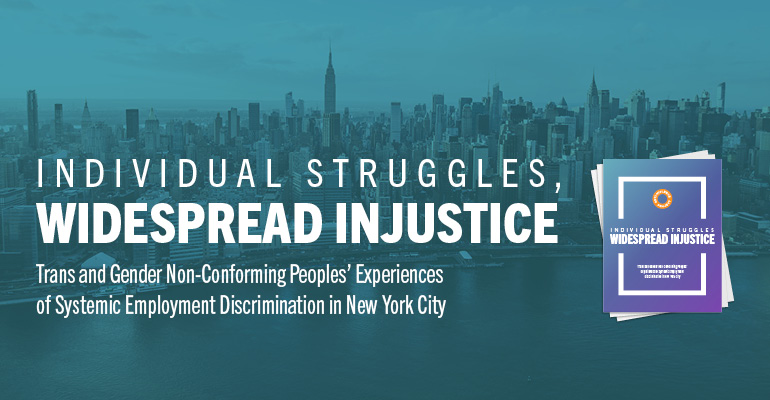
FOR IMMEDIATE RELEASE
December 11, 2018
Media Contacts:
Eliel Cruz, Director of Communications: ecruz@avp.org
Ciarra Ross, Communications Coordinator: cross@avp.org
New Report Outlines Widespread Employment Discrimination
Against TGNC New Yorkers
New York, NY – A new report from The New York City Anti-Violence Project (AVP) captures the systemic employment discrimination against trans and gender non-conforming (TGNC) people in New York City. Individual Struggles, Widespread Injustice contains survey responses collected from 118 TGNC respondents, revealing clear patterns of discrimination during the job search process, harassment in the workplace, unemployment and poverty rates higher than that of the general public, and a disconnect between their education level and income.
“As with all forms of violence, reporting incidents of employment discrimination can help trans and gender non-conforming folks figure out what the best next steps are for them. Unfortunately, our survey found that trans and gender non-conforming New Yorkers aren’t aware of the options for reporting to city agencies, and when they report discrimination inside their workplaces they often face retaliation,” Audacia Ray, Director of Community Organizing and Public Advocacy at The New York City Anti-Violence Project said. “It’s imperative that New York City Council introduce legislation that extends the amount of time people have to file employment discrimination complaints with the City Commission on Human Rights from one to three years. This extension will allow for more trans and gender non-conforming survivors of workplace discrimination to report and receive recourse from the violence they experienced.”
Individual Struggles, Widespread Injustice survey responses were collected during an 18 to 23 month period following the 2016 implementation of the city’s Gender Identity/Gender Expressions Legal Enforcement Guidance. The guidance, a clarification on the Transgender Rights Law passed in 2002, contained specific enforcements of the law detailing the rights of TGNC community in New York City. Still, despite protections, trans and gender non-conforming residents in New York City are struggling to find jobs and facing discrimination at their places of work.
LaLa Zanell, Lead Community Organizer at The New York City Anti-Violence Project said:
“After the Mayor rolled out the Executive Order and City Commission on Human Rights released the Legal Guidance, trans and gender non-conforming community members decided to investigate the initial effectiveness of the local policies. Our objective with the survey was to learn whether community members knew about the policies, if the policies were working, and if there were any changes in community members’ entry points into employment. This report addresses the progressive strides made and what we need to continue to do around trans and gender non-conforming economic justice.”
Some key findings:
- TGNC people have diverse genders, and many do not identify with the gender binary. 48% of survey respondents indicated that they identified as gender non-conforming, non-binary, genderqueer, two-spirit, third gender, agender, androgynous, or trans. 31% of respondents use they/them/theirs pronouns.
- 22% of TGNC New Yorkers surveyed are unemployed, which is nearly five times higher than the New York City unemployment rate.
- For jobs in which filling out an application form is required, 57% of respondents had to fill out a form on which they had to choose a gender that did not match their identity. Thirty-one percent of respondents were asked about how they were assigned at birth, which is an illegal question in an application and interview process in New York State.
“New Yorkers, no matter where they come from, have the right to have their pronouns, name, and title respected, regardless of what is on their identification documents. When an employer or coworker misgenders or deadnames a trans or gender non-conforming colleague, that is violence, and is discrimination under the New York City Transgender Rights Law,” Lolan Sevilla, Training Coordinator at The New York City Anti-Violence Project said. “All employee databases across the city must have options for trans and gender non-conforming people who have not taken legal steps to change their name or gender marker so that trans and gender non-conforming employees feel respected and protected.”
The Individual Struggles, Widespread Injustice report is released in conjunction with community based report Speak Up About It! Geared towards the TGNC community, Speak Up About It! includes practical information on rights New York City upholds for TGNC people, interviews with community members, and actions TGNC New Yorkers can take if they are are discriminated against or their rights are violated including recommendations from the NYC Commission on Human Rights.
“As we know all too well at the NYC Commission on Human Rights, TGNC individuals endure a range of discrimination and harassment in their daily lives, including in the workplace. This is simply unacceptable,” said Chanel Lopez, Transgender Communities Liaison at the NYC Commission on Human Rights. “Under Mayor de Blasio, the Commission has significantly increased its efforts to combat gender identity discrimination citywide — more than doubling the number of investigations in this area over the last two years — but the fight to protect, uplift, and empower TGNC New Yorkers continues. We look forward to continuing our work with AVP to educate TGNC communities about their rights and how to report discrimination and continue to work with employers to ensure that TGNC folks get the respect and opportunities they deserve.”
Both Individual Struggles, Widespread Injustice and Speak Up About It! can be read in full at avp.org
###
The New York City Anti-Violence Project empowers lesbian, gay, bisexual, transgender, queer, and HIV-affected communities and allies to end violence through organizing and education, and supports survivors through counseling and advocacy.
